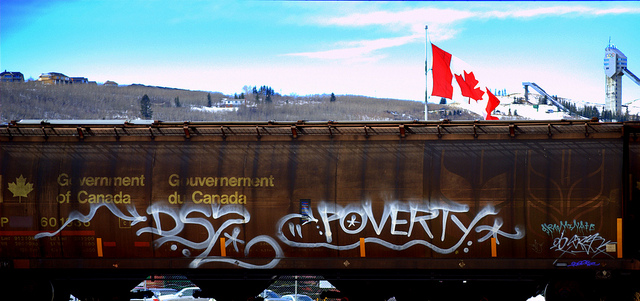Like this story? Chip in to keep stories like these coming.
![]()
Approximately 4.8 million Canadians — that’s one in seven — live in poverty.
This week, Citizens for Public Justice and Canada Without Poverty, two groups that address issues of homelessness, early childhood education and how to organize around anti-poverty activism, released a national action plan to address income insecurity among Canadians.
“It is never acceptable for a rich country to do nothing about poverty, and now is certainly not the time,” said Canada Without Poverty’s Executive Director Leilani Farha in a press release.
The national plan is just one part of a larger campaign with the goal of achieving a poverty-free Canada, through collaboration and commitment by the federal government.
“This is a call for the federal government to act,” said Citizens for Public Justice Communications Coordinator Brad Wassink. “But, we are also expecting collaboration from provincial and territorial governments.”
Dignity for All: Campaign for a Poverty-Free Canada got its start in 2009. Its three goals are the creation of a comprehensive national plan for poverty eradication, implementation of a federal anti-poverty act and the collection of sufficient federal revenue to provide social services to all Canadians, states the report.
Dignity for All’s emphasis on federal government support is based on the idea that poverty is a violation of Canada’s human rights obligations as a signatory of many significant treaties such as the Universal Declaration of Human Rights and the International Covenant on Economic, Social, and Cultural Rights.
The national plan focuses on six key areas: labour and employment, health, income security, housing and homelessness and early childhood education and care.
“We offer this plan as a starting point,” the report said. “A solid, considered, informed starting point. In 2015, a federal election year, every political party platform should include the commitment to develop, and then implement, a national anti-poverty plan.”
In November 2014, 25 years after former NDP leader Ed Broadbent pushed forward a motion to end child poverty, the Conservatives did not back an NDP motion to recommit to the goal.
Dignity for All recommended the government increase the national child benefit to $5,600 annually for eligible families as well as index it to the cost of living. Currently, the national child benefit sits at $3485-$3244 based on the number of children.
Currently, under the universal child care benefit families receive a taxable benefit of $100 per child under six each month. In October, the government announced that the benefit would increase by $60.
The reports recommendations should be reflected in the platforms of the federal parties this election season, stated Wassink.
“It is our hope that the federal parties care about poverty and place it as key points in their platforms,” said Wassink. “We want to go around the country and get voters to care about it.”
Francella Fiallos is a fourth-year journalism student at Carleton University in Ottawa. She sits on the Board of Directors at OPIRG-Carleton, edits a campus newspaper, and hosts a radio show on 93.1 CKCU FM in the capital region.
Like this story? Chip in to keep stories like these coming.
![]()



